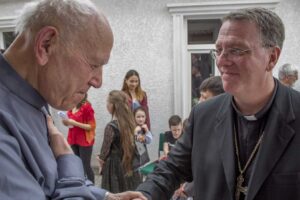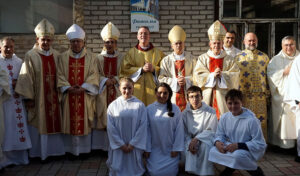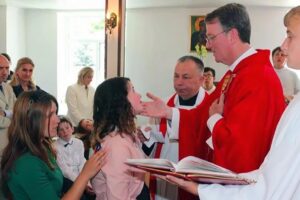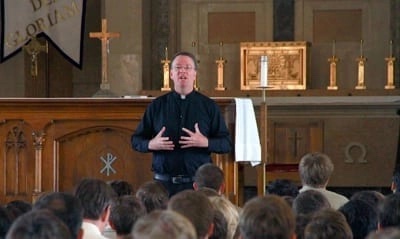On February 21, 2023, Fr. Anthony Corcoran visited Jesuit Dallas from Kyrgyzstan to speak with students on his time back home. Fr. Corcoran is a native Texan and has traveled to many different countries around the world spreading the Word of God to people who have never interacted with God or heard of Christianity. Jesuit students, during Fr. Corcoran’s visit, were able to hear his story and what it is like to be a priest in Kyrgyzstan. Fr. Corcoran was able to give student’s an inspirational message on how we can all spread the Word of God even if there is barriers in our way like different languages or a small Christian population.
Interview with Fr. Anthony Corcoran
Fr. Corcoran entered the Society of Jesus in 1985. Eleven years later, he was ordained a priest. In the past 25 years, Fr. Corcoran has done many great things. While Fr. Corcoran is a constantly traveling man, spreading the Word from countries like Thailand, Poland, and Kyrgyzstan, I was able to interview him through email to hear more about his journey during priesthood.

What do you think is the importance of getting to understand different culture’s practices of Christianity?
Our willingness to attempt to understand “different cultures’ practices of Christianity” helps us to appreciate just how amazing our Faith is. If God became human in Jesus—it was in a specific place and time, to a particular people. Jesus lived in the culture, spoke a language that was comprehensible, and shared with those around Him in a manner that was approachable the most important message in all of history: the meaning of life in this world and its connection to eternity (salvation).
Although the end or goal is not to try and imitate a culture, but to see it as an absolutely necessary means to share all that is important. We can easily get lost or distracted if the culture becomes the end and is all that shapes our meaning. However, reality is always set in a particular context that we must sufficiently recognize and respect.
The fact that Christianity exists in so many places should challenge and strengthen our appreciation of our faith—handed on to us by particular people in an accessible way. Maybe many people don’t accept this life-giving faith precisely because it has never been expressed to them in an approachable, accessible way. If foreign missionaries must learn foreign local languages, everyone should be willing to learn the “language” (i.e., not foreign, but one that is comprehensible) of the people with whom we would want to share that which is most important. St. Ignatius referred to this as “going in their door in order to bring them through Christ’s.”
How do you think it is to sometimes be in uncomfortable situations in where you live and how it is to preach in Kyrgyzstan?
Well, I guess everyone finds themselves in an uncomfortable situation if they really want to preach/share what is most important. One of the old missionaries I met before I left to work in the former Soviet Union many years ago reminded me that: “a missionary goes to a place where he is not wanted but needed, and stays until he is wanted but needed.”
I notice that in all the Gospel events, the people who receive something from Jesus are the ones that are willing to be inconvenienced. Although being inconvenienced is not an end-in-itself, I confess that I too often do not let myself be sufficiently inconvenient. But, I believe that a lot of the great part of life comes from this willingness to be inconvenient.
I remind you all that each one of you who is baptized is also a missionary, wherever you find yourself and among whomever surrounds you.
When I asked several people who converted to Christianity in an area in Central Asia where there are almost no Christians why they converted, almost all of them answered that “someone loved me enough to tell me about Christ.” Thank God for these people who loved enough to be inconvenienced and who witnessed about this faith—with words or through actions first.
How do you think people can help the need to help others in need and the spread of Christianity?
I think that this answer echoes the previous ones:
Do we really know Jesus Christ—and the most amazing act of love in history?
Do we try and find a “language” that is attractive and comprehensible? Really, are we daring enough to be generous and concrete enough in our love to share what is most important?

What do you think the Jesuit community can do to help grow their spiritual growth?
I think whatever we pursue with focus grows. We know that Jesuit education at its best is about developing the whole person, to become oneself so that we might be men and women for others—academically, spiritually, physically, emotionally. If we are truly interested in spiritual growth, we have to be willing both go the Source of this (i.e., in prayer and otherwise spending time with God) and to recognize that for everything that is worth pursuing it is necessary to be willing to know what we say “yes” to in our daily life and what we need to say “no” to… if we are to find peace and happiness. As they say, happiness can’t be a goal, but is a consequence to a spiritual life that is vibrant and shared.
So, our effort and some disciplined focus is always fueled by God who does everything in and for us.
I have observed everywhere in the world that this is one of the most important characteristics in life: to live in hope. Like any “virtue,” it is both a gift (so we ask for it) and a skill (that has to be exercised every day). This means that we have to choose to live with hope. When we are small, we learn to “suppress” our desire to physically express negative or harmful impulses. This is not the same as “repressing” them—which is not healthy. However, suppressing the negative influences, impulses, habits is key to avoiding problematic living and the source of having a fruitful and joyful life.

We need to regularly be in touch with people who have hope, who have faith, and who really do love; we need to not give in to impulses or to be dragged down by influences that tear down our hope. Although it is not our place to judge other people, we need to stop listening when people tear away at hope or always focus on the negative in life…or when we ourselves focus too much on these things.
Of course, this is not merely about being an optimist—or about having to cheer others or ourselves on by denying difficulty; it is about accepting that reality is bigger than any one moment, event, problem, or situation. This—whatever is happening—isn’t the final word!
Antoine de Saint-Exupéry, the author of the Little Prince and a devout Catholic, insisted that “the most important in life is (always) the invisible.” This means that there is much more than just what we see, own, feel, experience.
St. Paul told us that our hope would not disappoint us, and that “our hope is founded in the unseen; for the seen is temporary and the unseen is eternal.” In short, we need to choose to be “realists” and listen to that which points us beyond this situation (while accepting that the “material” and obvious too are an important part of reality) to so much more than we can understand or feel at this particular moment. A realist lives among the material but knows that realism is based in eternity’s connection to all of this. Are we realists?
And, as they say, courageous people aren’t ones who don’t fear. On the contrary, they may fear much more than most other people; they just develop the habit of choosing to trust beyond their fears. They don’t give up and they don’t surrender to their fear. The same goes for patient people (who may feel more inpatient than most) and for people of hope or faith or love (who may have doubts or sometimes feel down). The difference comes from how and why we choose to act.

More Information about Father Corcoran
During Father Corcoran’s talk at school he talked about as a priest you can be called to go anywhere for a new assignment. For Fr. Corcoran, he was called to New Orleans right before he was ordained which changed his schedule. However, Fr. Corcoran noted that his call made him stronger and more committed afterwards. In addition, Father Corcoran served time as a priest in Russia and in 2017, Pope Francis appointed him apostolic administrator for Kyrgyzstan.
Stay tuned to The Roundup for more community news and profiles!






